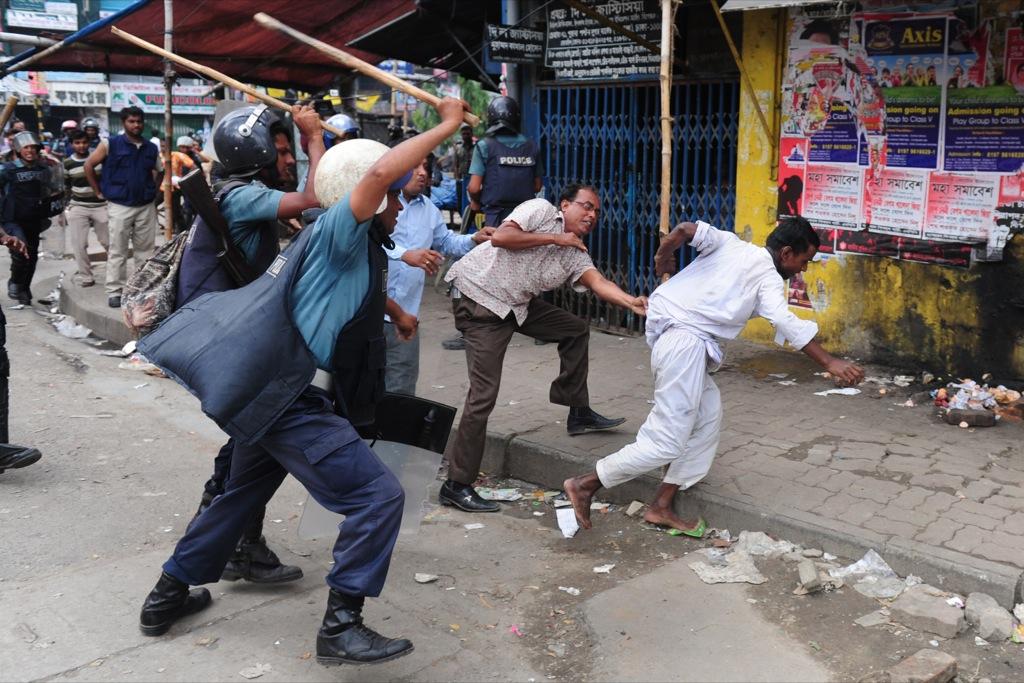Endemic corruption in Bangladesh is leaving children dead in the street
Bangladeshi police charge Islamists during clashes in Dhaka on May 5, 2013.
DHAKA, Bangladesh — Abdul, a 16-year-old student from Rangpur district, described what he saw and heard as four members of the Border Guard Bangladesh — a paramilitary force — opened fire on a crowd of protesters from a raised platform.
“I heard separate shots. One. Two. Three. They shot, reloaded, and then shot again. I saw that with my own eyes.”
Human Rights Watch spoke to Abdul, whose name has been changed to protect him, five days after the Rana Plaza garment factory collapsed in April 2013, killing 1,134. Though the incident he described happened months earlier and was unrelated to the collapse, both embody the breakdown of justice in Bangladesh, plagued by zero accountability and endemic corruption. This is a government that claims to be democratic but suppresses critics with jail time and bullets.
Three people were killed in the moments Abdul witnessed on Feb. 28. One was shot in the throat, one in the head, and a third was hit in the chest. The protesters had been shouting slogans in support of Delwar Hossain Sayeedi, a charismatic political leader of Islamist party Jamaat-e-Islami who had been sentenced to death.
Later that day, 40 protesters were rounded up and arrested in connection with the deaths. None of their family members could visit them in detention, Abdul told us, because “they are scared of being arrested, too.”
This was not an isolated incident. In April, we documented case after case of violence by security forces against unarmed citizens, many of whom were not even participating in protests but happened to be in the vicinity. In some instances, police were overwhelmed by the number of demonstrators, and suffered casualties themselves.
We documented at least 150 killed during these outburst of violence, seven of whom were children. Most of the incidents were in reaction to the verdicts handed down by the International Criminal Tribunal (ICT), which has so far convicted six leaders of Jamaat for their alleged participation in war crimes in the 1971 war for independence.
The ICT, a domestic court, was set up by the ruling Awami League government in 2010 to prosecute those Bangladeshis responsible for alleged abuses during Bangladesh’s liberation war. Accountability in the courts has been delayed for decades by shifting politics; some of those accused of war crimes had even gained political office and other leadership positions.
Though the tribunal holds popular backing among supporters of the ruling party, it remains highly politicized. Each conviction has resulted in large-scale protests by both supporters and opponents of the sentences. Large numbers of protesters came onto the streets to demand the death penalty after the court handed down a life sentence for a senior member of the Jamaat party. Jamaat supporters later called strikes, engaged in violence and staged counter-demonstrations.
The trials themselves have nearly collapsed under the weight of corruption. Last year, a witness for the defense was abducted in front of the courthouse, and the credibility and neutrality of those involved in the prosecution has been called into serious question.
On Aug. 1, the High Court of Bangladesh ruled that Jamaat, one of the main opposition parties in Bangladesh, is illegal. Unless it wins an appeal, it will be out of the picture and unable to offer candidates for the January 2014 national elections.
One of the more disturbing consequences of the failure to ensure basic rights here has been the alleged deaths of at least six children, mainly at the hands of security forces. One of those victims was said to be a 12-year-old boy who was shot as he stood outside his school watching a protest in his village.
His grandfather, “Lokhman,” who witnessed the shooting, told us: “My grandson died on the spot — the bullet hit him on the right side, there was an exit wound, but I fainted when I saw him.”
In a pattern that we heard repeatedly, Lokhman has since been in hiding out of fear of being charged in the death of his grandson.
There was also 17-year-old Sajat, who was killed execution-style with a close-entry bullet wound to the temple after making photocopies in the market so he could study for an exam. A witness to the killing told us he saw police chasing Sajat, then heard “a single gunshot” ring out.
Despite requests for information, there is no evidence that any of the cases we documented are being investigated, or that any of the officers who used lethal force against children, unarmed protesters and bystanders have been disciplined or tried. At the very least, the authorities should establish an independent commission to look into the events of the past six months.
Bangladesh is at a tipping point. Elections are looming, and more verdicts from the tribunal are expected in the coming weeks and months.
The deadly collapse of a garment factory in April focused the eyes of the world on Bangladesh. The country can no longer allow its security forces to gun down children in the street and assume that no one is watching.
Kyle Hunter is an associate in the Emergencies Division at Human Rights Watch. He has conducted human rights research in Bangladesh and South Africa.
Every day, reporters and producers at The World are hard at work bringing you human-centered news from across the globe. But we can’t do it without you. We need your support to ensure we can continue this work for another year.
Make a gift today, and you’ll help us unlock a matching gift of $67,000!
